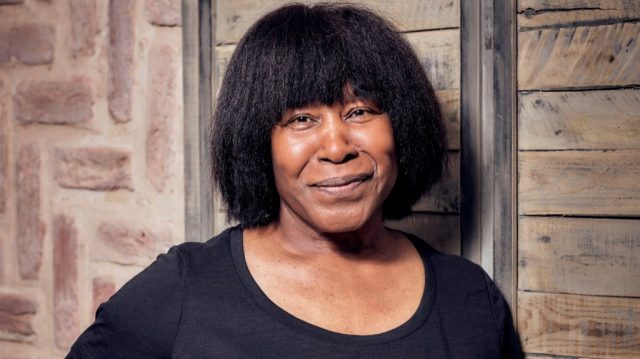

The legendary singer-songwriter talks about Joni Mitchell, guarding her privacy and how she’s changing her musical direction
An interview by Dan Cairns for The Times of London.
With the possible exception of Beyoncé and Chris Martin, Joan Armatrading is the most self-assured and self-contained musician I’ve interviewed. The veteran singer, 72, sees no need for false modesty and, while she may not blow her trumpet loudly from the rooftops, she’s perfectly willing to give it the odd parp. When she was starting out in the early Seventies, she says, “someone told me that my career would last five years”. She pauses. “He must have meant to say 50.”
Armatrading, who has released 20 studio albums over five decades, has now written her first symphony, which receives its premiere this week in London with Chineke! Orchestra. “I always knew I would write a symphony,” the singer says, matter-of-factly. “And then one day I was in the studio and I thought, ‘It’s today,’ and I just started.”
Will her fans be surprised by her move into classical music? “To some people it might seem like a big, daunting thing. Not to me. I’m just writing,” she says with a shrug. “That’s what I do.”

Armatrading performing in 1980
If this makes Armatrading sound haughty, that’s doing her a disservice. She’s alive to the many absurdities of the world she operates in, and our conversation is punctuated by her ready and throaty laugh. Within her clearly marked boundaries she’s fantastic company.
Armatrading launched herself on the British and, later, international stage in the Seventies, a black woman bucking trends with her intricate, intimate folk and rock music. She always seemed to have a refreshingly unsentimental approach to her craft — something she says has been the case ever since she started writing songs as a teenager, the third of six children of parents from the Caribbean islands of Saint Kitts and Nevis who had settled in Birmingham. You can see it in her game-changing performance of her breakthrough single, Love and Affection, on The Old Grey Whistle Test in 1976. Where other artists might have showboated, she introduces the song with a terse: “Track four, side two, album three, Joan Armatrading.”
The singer is notoriously protective of her privacy. She is believed to have entered into a civil partnership with the artist Maggie Butler in 2011, but little else is known about her life outside of music — which is how she likes it. The majority of her songs, she emphasises, are observational rather than personal. “You can’t write about yourself all the time: it’s not going to work. Actually, it’s impossible.
“People say things like: ‘All of Joni Mitchell’s songs are about her,’” says Armatrading, who was somewhat simplistically compared to Mitchell when she emerged. “No they’re not. She’ll tell you they’re not. And if you want any self-preservation you don’t do that. I certainly don’t. It’s not interesting enough anyway. You’ve going to run out [of things to say].” But what if Armatrading were a budding artist now, in the age of social media? “I’d be just the same,” she says, without hesitating, before adding, archly: “I know I wouldn’t be posting photographs of my breakfast. What’s wrong with mystery? People don’t need to know everything about you. Maybe some musicians don’t have enough belief in their artistry or they feel that their creativity isn’t enough so they say all this other stuff to make people like them. I just need the songs; I don’t need anything else.”
How is she with praise? “Quite often I don’t really believe it. I remember one of the first times going on a plane when my name was out there and all these people kept coming up and asking for my autograph, and all I could think was: ‘Somebody has set these people up.’”
Armatrading’s commercial peak has long since passed — between 1976 and 1983 she chalked up a succession of hit singles and albums — but she continues to tour and release records, and maintains a devoted fan base that has stayed with her through many and varied musical iterations. Now comes the symphony.
“There’s no reason to be afraid,” she says. “If you make something that you don’t like at the end, nobody has to know. You’re not going, ‘I did this, but I don’t like it — but here, you listen to it.’ You just keep it to yourself. When I was writing the symphony I was thinking, ‘I just want to be me — I don’t want to be a mini Beethoven or a mini Mozart or an imitation of Rachmaninov or whoever.’”
The home-recorded version of the symphony that Armatrading plays me is audibly alive to the endless potential of an orchestra and the symphonic form, with its textures, contrasts and colours touching base with JS Bach, Richard Strauss, Hubert Parry, Michael Tippett, Philip Glass, Maurice Jarre and more. The work is simply another part of her life and career, she says. “The only person I know is this one … I know no other way of being, feeling, the things I say, the things I do. That’s it. It’s so much easier to just be yourself. I can’t be bothered with all the other stuff — sorry.”
A rare note of apology from an artist who has built a career doing the opposite. Why would she write a symphony, some may ask. Her answer: why not?
The legendary singer-songwriter talks about Joni Mitchell, guarding her privacy and how she’s changing her musical direction An interview by Dan Cairns for The Times of London. With the possible exception of Beyoncé and Chris Martin, Joan Armatrading is the most self-assured and self-contained musician I’ve interviewed. The veteran singer, 72, sees no need for






